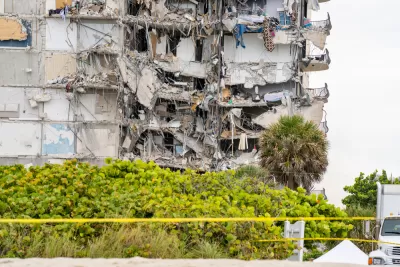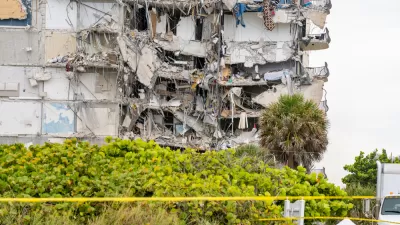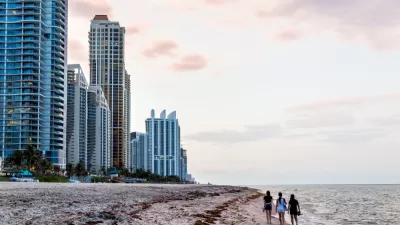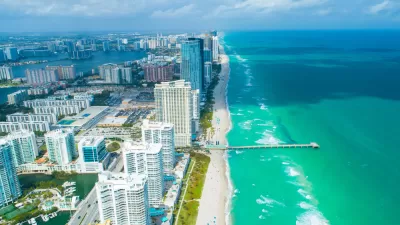Last year's Miami Beach condo collapse could portend more tragedy to come if developers don't address the risks of aging buildings and climate change.

In a deeply reported piece in The New York Times, Matthew Shaer examines the risks faced by Miami Beach's many high-rise condo buildings, a risk made painfully clear by the June 2021 collapse of a Surfside high-rise. With 98 fatalities, the collapse was "one of the deadliest engineering failures in the history of the United States."
According to James McGuinness, chief building official for Surfside, "This terrible tragedy, which is a national tragedy, is going to change the building codes as they relate to certification and all existing buildings." McGuinness warned that the soil that buildings are built on is an important factor, particularly in coastal zones where existing land is often shored up with infill.
But meaningful reform, of the kind McGuinness imagined, has long been notoriously hard to enact. Florida has roughly 1.5 million residential condo units — among the most of any state — and a highly lucrative condo and co-op industry with many powerful players, from management companies and developers to firms specializing in condo law. Historically, these groups, and the lobbyists who represent them, have successfully pushed back against any policy they view as constrictive or unduly expensive.
Built at the turn of the 20th century on a foundation of former mangrove swamps, Miami Beach is home to hundreds of aging buildings that face similar risks to Champlain Towers. Experts say the state must urgently strengthen regulations that hold developers accountable for the safety of their projects, regulations described in more detail in the source article. Many residents, Shaer writes, find themselves in a bind. "Median house prices are soaring; the real estate market is sloshing with investor cash. But the dangers of staying put are potentially even greater."
FULL STORY: The Towers and the Ticking Clock

Alabama: Trump Terminates Settlements for Black Communities Harmed By Raw Sewage
Trump deemed the landmark civil rights agreement “illegal DEI and environmental justice policy.”

Study: Maui’s Plan to Convert Vacation Rentals to Long-Term Housing Could Cause Nearly $1 Billion Economic Loss
The plan would reduce visitor accommodation by 25% resulting in 1,900 jobs lost.

Planetizen Federal Action Tracker
A weekly monitor of how Trump’s orders and actions are impacting planners and planning in America.

Wind Energy on the Rise Despite Federal Policy Reversal
The Trump administration is revoking federal support for renewable energy, but demand for new projects continues unabated.

Passengers Flock to Caltrain After Electrification
The new electric trains are running faster and more reliably, leading to strong ridership growth on the Bay Area rail system.

Texas Churches Rally Behind ‘Yes in God’s Back Yard’ Legislation
Religious leaders want the state to reduce zoning regulations to streamline leasing church-owned land to housing developers.
Urban Design for Planners 1: Software Tools
This six-course series explores essential urban design concepts using open source software and equips planners with the tools they need to participate fully in the urban design process.
Planning for Universal Design
Learn the tools for implementing Universal Design in planning regulations.
Caltrans
Smith Gee Studio
Institute for Housing and Urban Development Studies (IHS)
City of Grandview
Harvard GSD Executive Education
Toledo-Lucas County Plan Commissions
Salt Lake City
NYU Wagner Graduate School of Public Service





























